Search
Showing 10 of 1867 results for how to register international groups
-
SIEBA launches Schools Global Citizenship Pilot Programme
A network of 20 schools will take part, receiving professional advice and support to create, introduce and embed global citizenship strategies and initiatives across their schools.
SIEBA’s recent report on international business recovery for schools highlighted global citizenship education as one of three key areas expected to underpin business recovery and the future of international education, both within New Zealand and globally. The other two areas are sustainability/climate action, and growth in school-to-university pathways.
Global citizenship programmes contribute to a better international student experience, build understanding and support for international education, and enrich the value proposition that schools offer both domestic and international students.
Image above: Japanese and Kiwi students discovering science together at Awatapu College in Palmerston North
“Global citizenship education (GCED) has the potential to bring local and international students together through a focus on global issues, and in development of global competencies. International students and parents are increasingly looking for schools that can demonstrably deliver GCED within the educational experience," the report says.
The pilot programme will be delivered in collaboration with the Centres of Asia-Pacific Excellence. The schools involved will draft Global Citizenship strategies linked to a range of programmes throughout the school, including learning content and teaching approaches, co-curricular programmes, professional learning and development, and student-led initiatives. They will examine how Te Tiriti o Waitangi and Te Ao Māori will underpin their global citizenship strategies. Schools will start local, this will be a multi-year journey, and the result will look different in every school.
Developing global citizens is also one of the overarching goals of the New Zealand International Education Strategy.
-
Sharing our stories about international education
As we prepare for more international students to return to New Zealand, we want to ensure these important guests feel welcome and appreciated by Kiwis. Each time students arrive on our shores, we have a moment to spotlight why international education is great for our communities and the country.
We’ve recently added some new case studies to our Skills Lab website - read more about a successful storytelling example from Hawke’s Bay here.
Many great stories come from the compelling research projects being led by international students in New Zealand. These stories align with our story framework by highlighting how international education helps to shape global citizens and solve the world’s problems.
For example, Dr Htin Lin Aung, a researcher at the University of Otago, is conducting ground-breaking research on tuberculosis (TB), the world’s second-leading infectious killer after COVID-19. Read more about this case study of a newsworthy story about a scientific breakthrough here.
Stories of international education in your organisation, school or region do not have to be serious or complicated. Often, the most intriguing news stories are of everyday people doing good in their communities.
We refer to these as “soft-news” stories, as they are underpinned by a human-interest angle. You can successfully land these stories if you make sure to include the key elements that make up a news story. You can read about how Learning Hawke’s Bay landed a positive story about international education here.
Stories can often have a strong local flavour, which is appealing for local media channels.
This case study will explain how Tauranga’s economic development agency Priority One planned three news stories within the space of a month, a strong example of how a series of stories can quickly build momentum and newsworthiness at a local level. You can read more about this case study here.
If you haven’t used Skills Lab or Brand Lab before, you can sign in through MaiENZ here.
Download Communicating the benefits of international education – a toolkit from Brand Lab.
Latest case studies on Skills Lab:
- Social Licence: Determining a link to Education New Zealand’s new social licence narrative https://skillslab.enz.govt.nz/case-studies/social-licence/
- Social Licence: Developing newsworthy stories about scientific breakthroughs https://skillslab.enz.govt.nz/case-studies/social-licence-scientific/
- Social Licence: Getting feel-good stories on the front page https://skillslab.enz.govt.nz/case-studies/social-licence-feelgood/
- Social Licence: Crafting a story that resonates at a regional level https://skillslab.enz.govt.nz/case-studies/social-licence-regional-level/
-
Upcoming events related to international education – E-News June 2022
Dates
Event
Location
2,3 July
Duc Anh A&T: Global Education Fair
Information for prospective students
Contact: Van Banh
Ho Chi Minh City and Ha Noi, Viet Nam/online
5 July
New Zealand Centre
Announcement of the first batch of joint research proposals from NZ universities and Indian Institute of Technology Delhi
Contact: Jugnu Roy
New Delhi, India
7 July
ENZRA workshop – ENZ is organising a workshop to discuss the vision for the NZ education industry, promotional strategy, and next steps around the border opening. The workshop is exclusively for all India headquartered ENZRA office owners and decision makers.
Contact: Monika Chaudhary
Mumbai, India
July TBC
ENZ/MFAT Alumni Function – ENZ is working alongside Ministry of Foreign Affairs and Trade to deliver an alumni function under the banner of 50 Years Diplomatic Relations, highlighting the importance of our education partnership
Contact: Jane Liu
Beijing, China
9,10 July
IDP Overseas Study Exhibition
Information for prospective students
Contact: Van Banh
Ha Noi, Ho Chi Minh City, Vietnam
9 August
Te Pukenga International Strategy Launch
Media Roundtable: Business-to-business event followed by social networking with agents
Contact: Jugnu Roy
New Delhi, India
11 August
Te Pukenga MoU signing with Maharashtra Government
Formalise the MoU already signed by NZ Trade and Enterprise at a government-to-government level, with the Maharashtra government
Contact: Jugnu Roy
Mumbai, India
10-11 August
EduTECH Expo and Conference
Contact: Alana Pellow
Melbourne, Australia
15-19 August
New Zealand International Education Conference (NZIEC) 2022
The first conference for New Zealand’s international education sector since 2019
Contact: NZIEC@enz.govt.nz
Online
24-25 August
IC3 Annual Conference
ENZ is gold sponsor for the conference, which is the largest high school conference in India. Has participation from 6 of the 8 NZ universities. Supports the India undergraduate market development strategy
Contact: Monika Chaudhary
Hyderabad, India
27 – 28 August
The STAR Education Fair
Information for prospective students
Contact: Naluri Bella
Malaysia
August/Sept
Undergraduates – NZ Global Competence Certificate
Exchange programme focussed on tertiary students from India and NZ
Contact: Monika Chaudhary
Online
13-16 September
European Association for International Education (EAIE)
EAIE is the largest business-to-business conference and tertiary international education event in Europe. This year’s theme is ‘The Future in Full Colour’. ENZ will host a pavilion with New Zealand universities and ITPs and registrations to participate have now closed.
Contact: Olga Elli
Barcelona, Spain
14 – 15 September
Asia Pacific Technical Vocational Education and Training (APAC TVET) Forum
A partnership between ENZ, Te Pūkenga and Skills Consulting Group showcasing NZ vocational sector and its expertise. The forum will include academic and business-to-business/government-to-government elements, bringing together stakeholders across Asia and the Pacific to share expertise and capability.
Contact: Richard Kyle
Online –Asia and Pacific wide
23 September
2022 New Zealand – China Early Childhood Education Symposium
Co-hosted by Education New Zealand and China Centre for People to People Exchange, the third annual Early Childhood Education (ECE) Symposium will be a hybrid event bringing together professors, practitioners and teachers in the ECE field to share best practices. The theme of the 2022 Symposium is “Sustainable Development of Early Childhood Education.”
Contact: Rosemary An
China, Online
Sep/Oct
Market Development Activity (Kalimantan Region)
Information for prospective students
Contact: Naluri Bella
Balikpapan & Samarinda cities Kalimantan Region, Indonesia
21 – 29 October
China Education Expo (CEE)
Annual exhibition tour hosted by China Education Association for International Exchange (CEAIE) since 2000.
This major conference and expo is the leading international education event in China.
Contact: Jane Liu
Beijing, Guangzhou, Chengdu, Shanghai
-
International students welcomed at Waitangi
One such welcome to acknowledge and celebrate students from around the world took place on the Waitangi Treaty Grounds on 10 August 2022.
Study Northland organised a wonderful half day programme to welcome 70 international students currently studying at Whangarei Girls High, NorthTec, Kerikeri High School and Springbank School. This included a pōwhiri, cultural performance, and a ceremony in which each student was presented with Tū Ngātahi pins and welcome certificates. They then had the opportunity to explore the history and relevance of the Treaty Grounds, and the morning ended with fish and chips in the sunshine.
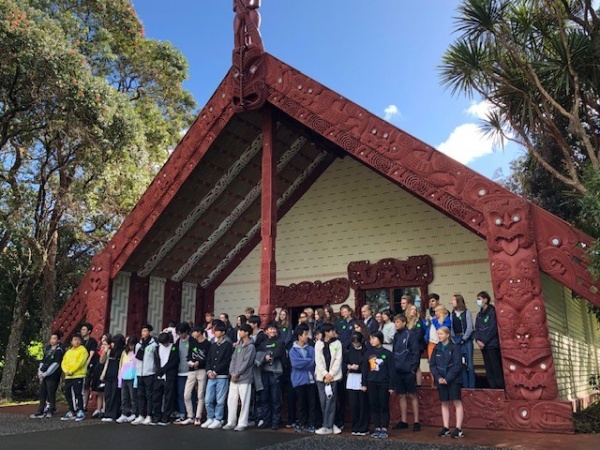
Students outside Te Wharenui at Waitangi
Tū Ngātahi is a te reo Māori phrase calling us to ‘stand together’. Education New Zealand Manapou ki te Ao developed this programme as a demonstration of welcome and support to international students, a celebration of the connection between cultures, and a recognition of the friendship and learning we share. The welcome at the Treaty Grounds was an ideal opportunity for the spirit and concept of Tū Ngātahi to be brought to life.
Ross Crossan (centre), ENZ’s Student Experience Manager, presented the students with Tū Ngātahi pins as part of the Waitangi welcome
Students were excited to be in New Zealand, some for the first time and some returning after heading back home during the pandemic.
Several of the recently arrived students at Whangarei Girls shared their first impressions with us. Fish and chips are certainly a hit, as is the chance to play badminton, volleyball, and other sports with friends. A few students mentioned the different school hours here. They also commented that just a little bit more time might be needed to get used to the weather!
Fish and chips were a highlight at Waitangi
Arisara Pungpho, from Thailand, is attending Springbank School. She has been coming to New Zealand for many years with her family. Arisara is here for six months, and says she most enjoys New Zealand’s environment, and its tranquillity and peacefulness.
“Most places in Thailand compared to New Zealand are very fast, very busy, and very lively,” Arisara says. “I also feel New Zealand is more inclusive of many cultures, which is not what I have experienced in other countries around the world.”
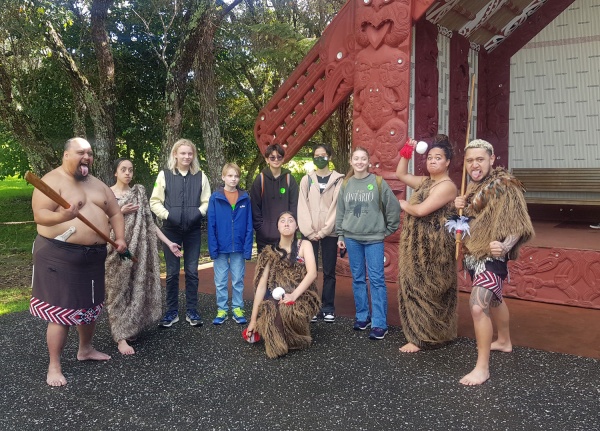
Springbank School students, including Arisara Pungpho (4th from left) and Elisabeth Ringel (3rd from left) enjoyed the cultural demonstration at Waitangi
Elisabeth Ringel particularly appreciated the warm welcome she received when she travelled here from Germany in July for a year.
“When I arrived in Auckland, I was surprised how friendly and welcoming everybody was, and how the brother of the Principal of Springbank School, with his family, drove me to my host family in Kerikeri – because my Auckland to Kerikeri flight was cancelled,” Elisabeth says.
With borders now open again, this is a significant moment for our international education sector, and we all look forward to welcoming more students to our institutions and communities over the coming months.
#TūNgātahi
Recent welcome events around the country
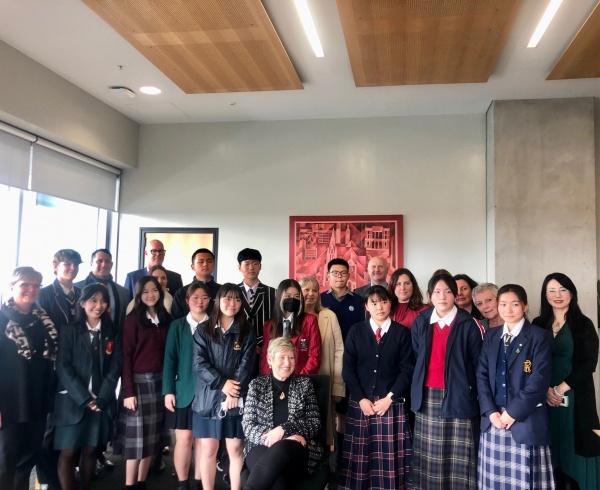
International students met with Christchurch Mayor Lianne Dalziel
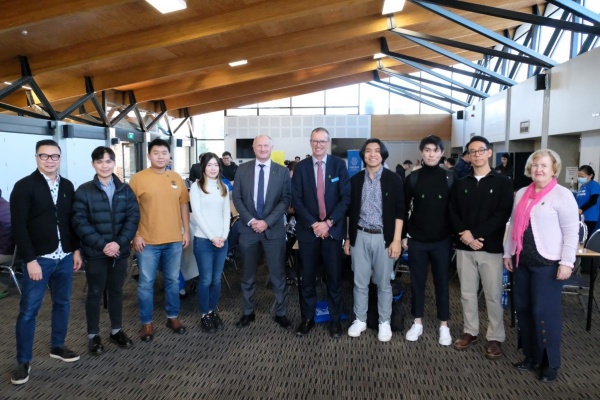
International students being welcomed to Lincoln University
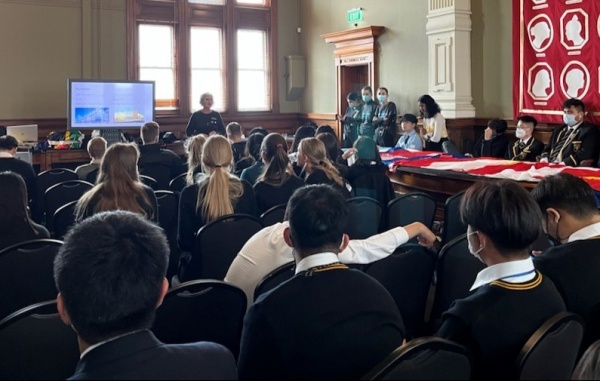
Wellington International Students' Association ran an event for over 140 international students from eight countries over the course of two days
-
March update from Immigration New Zealand
Update on Student visa processing*
Since New Zealand’s international borders reopened in August 2022, Immigration New Zealand (INZ) has received 29,228 student visa applications from international students outside of New Zealand. We have completed 24,549 of these applications.
Our recent processing times for international student visa applications are published on our website. These are updated each month: Visa processing times for international students | Immigration New Zealand
*Figures current as at 10pm on 6 March 2023.
Impact of Cyclone Gabrielle on international students
We are aware that some education providers' campuses have been damaged by Cyclone Gabrielle and have been forced to close temporarily.
This affects students’ immigration status because their current student visa requires them to attend the place of study specified on the visa which may not be currently possible. We understand that this is a difficult time, and we would like to help. An information sheet has been developed for affected international students and can be found here.
Approval in Principle timeframe
We have shortened the standard length of time we allow most offshore students to provide a tuition fee receipt (or other financial evidence) from ten to five working days to encourage students to complete the final steps of their student visa application quickly. We understand that some students may not be able to provide evidence in the timeframe they are given due to their individual circumstances. Extensions to this timeframe are available – the student or agent just needs to upload a brief letter explaining how much longer they will require and why.
Tuition fees
We would like to remind you that changes to the requirements for tuition fee payment evidence for students were introduced last year as part of the Immigration Rebalance.
Students need to pay tuition fees for the first year, or first programme of study (whichever is the shorter), and they will have to prove personal/maintenance funds for the same period. We do not accept payment of tuition fees by instalment; the only exception is for some aviation students.
Agent declaration
If you are providing advice or assistance with a student visa application - DECLARE yourself in the application. Education agents outside New Zealand are permitted to give immigration advice on student visas but must declare themselves in the application. We are seeing increasing numbers of agents not declaring themselves and these applications may take longer to process as a result.
INZ is intending to resume reporting on agent visa approval rates later this year, probably in September/October. If you are not declaring your involvement in an application, this will have an impact on your publicly available performance information. Education providers in New Zealand will be encouraged to check the agent performance report.
-
From the CE: New Zealand education promotion continues at pace
I can assure you I have never seen as much interest in New Zealand as an education destination. Despite the challenges we’re all aware of and the activities of our competitor countries, the New Zealand education offering remains attractive. We all must continue to tell the New Zealand education story.
On Friday 17 March, Minister of Education Jan Tinetti announced new appointments to our Board. I want to acknowledge outgoing Board Chair, Steve Maharey, and welcome Tracey Bridges to the role. Steve has been a stalwart and tireless advocate for international education, both in the community and the corridors of power for over 30 years. In his time as our Chair, he has seen and contributed to enormous change within the sector and ENZ. Personally, I have appreciated his deep understanding, straight talking and clear direction.
Tracey Bridges has knowledge of regional economic development, expertise in strategy, risk and reputation management, and in social marketing. She is Chair of the Wellington Economic Development Agency Limited (WellingtonNZ), co-founder of The Good Registry and sits on the Boards of Sky Stadium, Whānau Āwhina Plunket, the Wellfed NZ Trust and the Digital Media Trust.
Tracey is joined by Dr Therese Arseneau. Dr Arseneau also has knowledge of economic development including international education’s contribution to regional economic development, and governance experience in the tertiary sector at the Ara Institute and the Open Polytechnic. She previously chaired Regenerate Christchurch and Enterprise North Canterbury.
We all know that the contribution of international education is far broader than just the direct and immediate economic impact of the students that come to New Zealand. For the first time, ENZ along with EY have sought to quantify the extent and the value of these wider benefits.
Research commissioned by ENZ that will be released before the end of March found that international education is not only a significant contributor to the New Zealand economy but also that international students living and working in the country bring in a raft of social, cultural, and international benefits. It goes on to explore the extent of the indirect longer-term contribution to New Zealand’s GDP from the small proportion of international students that remain in New Zealand on completion of their studies. The research also quantifies the impact of the pandemic.
Look out for the formal release and when it is available I urge you to download the report from Intellilab.
To complete your international education-related reading list, our Briefing to the Incoming Minister, Minister Tinetti is now available here on the ENZ website. The BIM, as it is known, is prepared when new Ministers are appointed to portfolios.
He maurea kai whiria! – Ignore small matters and direct effort toward important projects!
Ngā mihi nui,
Grant McPherson
-
ISANA - Enhancing international student experiences
The ISANA New Zealand Annual Conference held at AUT University in Tāmaki Makaurau last month provided the perfect forum to address the challenges of strengthening capability and ensuring sustainability as the sector addresses ways in which to grow international education.
A key feature of the conference was the presentation of a new online ‘Capability Toolkit’ - a collaboration between ISANA NZ and Education New Zealand Manapou ki te Ao (ENZ). Developed as a resource for education practitioners, the toolkit presents strategies, tools, tips, guidelines, case studies, scenarios and more to assist with every facet of engagement with international learners.
ENZ’s General Manager Sector Services, Sahinde Pala, said that the conference provided a great opportunity to reconnect face-to-face with professional colleagues.
“We all enjoyed the opportunity to exchange experiences and hear from frontline practitioners how the rebuild of the sector is going from their perspective. It was a great opportunity to connect with those relatively new to the sector and let them know the role of ENZ and the resources available to assist them in their role.”
“It was also encouraging to see our industry coming together to collectively focus on improving our services for students. The Capability Toolkit is an important, practical resource that will assist education practitioners provide even better support for our international learners.”
The Capability Toolkit provides links to resources in the following areas:
- Wraparound tailored support for international students
- Critical incident management for international students
- Innovative leadership in international education
- Intercultural competence in educational contexts
- Student experience information for agents.
ENZ is continuing to work with ISANA to further develop the Capability Toolkit and other content will be added over time. In the meantime, anyone who has not had a chance to look at the toolkit, can explore this further on ISANA NZ’s website here.
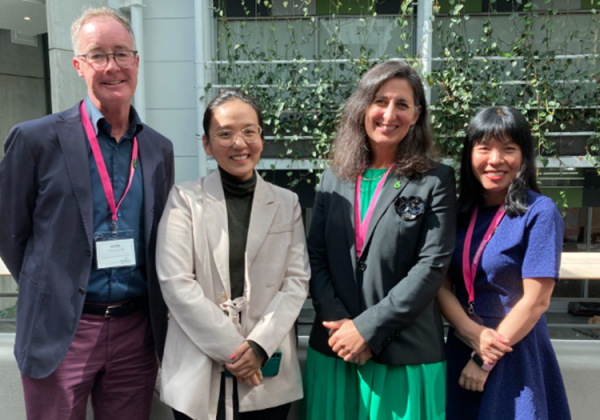
Vaelyn L, International Student Representative (second from left) with ENZ representatives at the ISANA conference Ross Crosson, Student Experience Manager, Sahinde Pala, General Manager Sector Services, and Faymie Li, Senior Advisor Student Experience
-
Around the world in five
Asia
A shift towards non-recruitment based engagement with Indian schools could be key to better managing student expectations, stakeholders have suggested. Those who have done it well – particularly schools in the US – have created engagement through faculty, immersion trips, experiential learning opportunities, curriculum engagement and alumni, The PIE learned.
North America
British Columbia is Canada's westernmost province, and a leading destination for international students within Canada. On 1 March, the BC Ministry of Post-Secondary Education and Future Skills released details of how the international student cap will be applied within the province's education system.
Europe
A new paper from a group of experts, including three former universities ministers, challenges suggestions that the United Kingdom has too many international students and warns that the government is using out-of-date data to predict the number of overseas students expected to come to the UK for their higher education.
Africa
International educators need to prepare for ‘The Africa Decade’, where enrolment growth rates of African students globally are expected to hit their fastest rates over the next 10 years. Modelling suggested African students will account for one in eight international students by 2050, but visa rejections are seriously hampering efforts to enrol students from across the continent.
Oceania
International students are more open to switching destinations following recent government policy changes in three of the top destinations – Australia, Canada and the UK, with the UK most affected and the USA looking set to benefit, according to a student survey conducted by global higher education-focused agency group IDP Education.
-
PIF Recipient: Tokona te Raki
Tokona te Raki has already led some brave pioneering work, such as challenging streaming in schools based on evidence it has a largely negative impact on Māori students, more often perpetuating inequity, rather than reducing it. They are working on indigenous youth pathways into digital futures, understanding future tribal skill needs and honing tribal innovation models.
With global challenges like climate change, shifting population demographics and the impact of technology all combining to create both uncertainty and opportunity, the future is there for the taking – or rather the shaping.
Tokona te Raki is an indigenous social innovation lab operating under the mana of Te Rūnanga o Ngāi Tahu. With over 76,000 registered tribal members and a territory covering over 80 percent of New Zealand’s South Island /Te Waipounamu, Ngāi Tahu is the largest iwi / tribe in Te Waipounamu.
With Māori youth being the fastest growing sector of the Aotearoa New Zealand population, Tokona te Raki is on a mission to tackle inequities they face in their journey through education and into enterprise and employment. Through projects with whānau, communities, and external partners, rangatahi are equipped and empowered with the tools and support to shape and be inspired by their futures, succeeding as Māori.
Their latest project is an ambitious one: to reimagine international education. With support from Education New Zealand Manapou ki te Ao (ENZ) as a Tiriti partner, through the International Education Product Innovation Fund, this vision to reshape indigenous education is moving closer over the horizon with a view towards a future where youth are confident, competent, and connected both tribally and globally.
‘Indigenous Future Making’ is a pilot project to reimagine the future of international education towards an indigenous vision of a tribal and global learning network. Te Ao Māori (the Māori world) and its knowledge systems create an identity unique to Aotearoa and sees the future as an opportunity rather than an inevitability.
To frame the project, Tokona te Raki has identified several ‘shifts’ that transform what international education can deliver for indigenous communities and learners. From colonial and Euro-centric to diverse, indigenous, and global; from physical, site-based delivery to place based and virtual delivery; from fixed-duration courses to lifelong learning; from rational (IQ) intelligence to emotional, cultural, and digital intelligence; and from narrow credentialling to flexible and adaptive credentialling.
Instead of framing international education through an economic lens and thinking of international learners in terms of revenue extraction, the pilot project imagines values-based value generation, a reciprocal, two-way street of learners travelling both into and out of Aotearoa New Zealand, education contributing to global challenges and collective action, and Aotearoa New Zealand being recognised for its unique value proposition: a caring, safe, secure, innovative and culturally relevant education provider.
The project will deliver an indigenous future-making framework, backed up with a toolkit and a curriculum. An online platform will be explored to serve as an indigenous knowledge exchange, facilitating the transfer of knowledge between and within Māori and other indigenous cultures.
Tokona Te Raki is among a range of pilot projects supported by ENZ’s Covid Response and Recovery Fund funded product and service diversification workstream. This New Zealand Government-funded initiative to encourages the development of new products and services in the international education sector.
The project explores how Aotearoa New Zealand can offer indigenous solutions to global challenges, such as climate change and social inequality. More than a funding contributor, ENZ is working with Tokona te Raki to explore what being a good Tiriti partnership should look like to best support and realise the full potential of an Iwi led project, leveraging each other’s networks and capabilities. The learnings from Indigenous Future Making, and the other pilots, will be shared for the benefit of Aotearoa New Zealand’s wider international education sector, encouraging other education providers and organisations to keep innovating for the future.
Learn more:
-
New Zealand star of the show in leading Brazilian international education magazine
In late April, the Consulate-General of New Zealand in São Paulo welcomed professionals from the international education sector for the launch of Belta's magazine ei – International Education. The event served to celebrate New Zealand as the magazine's feature country and was attended by government officials and Brazilians who studied in New Zealand institutions and now hold prominent positions in their professional fields.
Belta (Brazilian Language and Travel Association) brings together the leading Brazilian agencies offering travel programmes focused on international education. Agents associated with Belta are recognised for the safety and excellence of the services they provide to students.
The New Zealand delegation from Universities New Zealand, composed of representatives from five of the country's eight universities, and CAPES LATAM were present at the Consulate for the magazine launch event during their stay in Brazil for strategic meetings at FAUBAI 2024, Brazil's largest conference focusing on higher education.

ENZ’s Bruna Natale with the delegates from New Zealand.
Belta's publication is a quality reference for those seeking information about studying abroad. It is published annually and serves as a guide for those interested in experiencing international education. It is distributed at exchange fairs, travel agencies, and schools throughout the year. This is the third time that Belta's magazine has featured New Zealand's international education on its cover.
The guests were welcomed by the Ambassador of New Zealand in Brazil, Richard Prendergast, the market development manager of Education New Zealand Manapou ki te Ao (ENZ) in Brazil, Bruna de Natale, and Belta's president, Alexandre Argenta.
"Aotearoa New Zealand is open to Brazilian students, offering excellent education, institutions that prepare for future challenges, and a great quality of life, with safe cities and a friendly population," said Ambassador Prendergast at the event's opening.

Guests watch Ambassador Richard Prendergast’s speech.
Bruna de Natale states, "Highlighting New Zealand education in Belta's magazine is essential for Brazilians to be aware of the quality of education offered in Aotearoa New Zealand." Bruna also emphasises that "the magazine directly engages with the audience interested in studying abroad, reaching exchange fairs and agencies from all regions of Brazil, so it is a strategic visibility for positioning the quality of New Zealand education."
Representatives from exchange agencies who attended the reception conversed with members of the Universities New Zealand delegation and Brazilians who had studied in New Zealand.
"We have strong connections with Latin America in general, and especially with Brazil, but we want to strengthen and expand these partnerships," said Bronwen Kelly, Deputy Chief Executive of Universities New Zealand. Participating in strategic events, like today's launch and the FAUBAI conference, is a significant step towards bringing our institutions closer together and paving the way for academic exchange," Bronwen added.
In addition to Alexandre Argenta, Maura Leão, Director of International Relations at Belta, attended the event. Both were in New Zealand in March on a familiarisation trip organised by ENZ to introduce the country as an education destination.
"I've just returned from a fantastic experience in New Zealand," said Maura Leão during the event. "It's a country with many wonderful opportunities for students. I visited schools, universities, English language schools, and high schools. The experience was very positive. For us who work in education, it's essential to have this opportunity to share impressions with families who want to send their children to study abroad," said the executive.
The online version of the magazine can be found here: Revista ei! 2024 by Associação Belta - Issuu

Bruna de Natale with Belta’s International Relations Director, Maura Leão.

